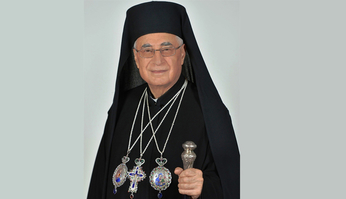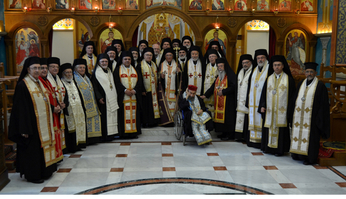Patriarch Youssef
Article by Fadi Noun, Orient le Jour on christmas letter 2007
The Christmas Letter of the Greek Catholic Patriarch
The Cultural Revolution that still awaits the Arab World
Article by Fady Noun Orient-Le Jour 24 December 2007
It is an important invitation that Patriarch Gregorios III has issued to the Muslim Arab world in his Christmas Letter, by asking it to be open to the idea of “sharing the Word” with Christianity, and not be frightened of Christian mission but allow it free expression, without proselytism and without fear.
It is noteworthy that it is as an Arab, and a Christian Arab, that Gregorios III is issuing his invitation. This is important. The Melkite Church, spurred on by its patriarch, has been clearly and strongly claiming its Arab identity for some years now, in faithfulness to a strong theological and historical line. Through this identity, the Arab Christian world finds clear affinities with the Muslim Arab world and Muslim faith, which is Arabophone, due to the sacred character of the Qur’an.
So Gregorios III is an Arab speaking to other Arabs. He takes his standpoint on a totalising Arab civilisation which is neither Muslim nor Christian, but a synthesis of two cultures, always bearing in mind the basic epistemological, scientific or ideological contributions of openness to modernity which have characterised the Arab world over the last two centuries. It is as a prophet of the future of the Arab world that he is speaking, daringly indeed, with frank and decisive words.
In fact his language echoes that of the foundational work of Father Corbon, “The Church of the Arabs,” anticipating the emergence of an Arab nation whose future, it is true, appears today hazardous politically speaking, but whose silhouette is beginning to appear under the stimulus of various factors of economic, linguistic, political and cultural change. Otherwise, what does the existence of an Arab League mean?
The importance of the invitation extended by Gregorios III lies also in the principle of reciprocity that he puts forward. This principle is fundamental in all interreligious dialogue, insofar as it is undertaken sincerely and seriously. (Let us not forget, in fact, that in Islam, because of the non-separation of religion and politics, any interfaith dialogue, if at all sincere, necessarily leads to concrete policy.)
The principle of reciprocity is simply my granting the other party, if I am in a position of strength, the justice that I claim for myself, when I am not. From this point of view, Gregorios III deliberately recalls the ostracism suffered by the Christian faith in Saudi Arabia where church buildings and liturgical celebrations are forbidden. John-Paul II had previously invoked this principle, when Rome’s mosque was inaugurated.
The call of Gregorios III remains respectful of Muslim faith. The “sharing of the Word” to which he invites is not, for the patriarch, a clash of proselytisms, even if there is the risk of there being an opportunity for that to happen. This sharing is primarily a tool for mutual understanding indicative of the degree of “civility” attainable by a society and its ability to resist cultural clashes and be exposed to otherness without feeling threatened in its own identity.
In short, there is in the invitation of Gregorios III something fundamental at stake for the Muslim Arab world: the transition from the letter of religion to its spirit, which is one of the keys of accession to modernity, understood in the epistemological sense of the term.
The transition from the letter to the spirit is the effort – seemingly difficult – that Christ asked of his co-religionists and which can be summed up in one of his sayings: “I will have mercy, and not sacrifice.”
In the gospels and apostolic letters, the principle can be seen at work at every level: respect for the commandments concerning parents, the Sabbath, food prohibitions, washing before meals, payment of tithes, mixing with non-Jews, examples abound where Christ and then his Apostles, especially Saint Paul, help the Jews of their day go beyond the letter of the rituals and commandments to reach their true meaning, that religion of the heart that will crown the definitive revelation of the truth, to know that God is Love.
It is a question then of a change that makes faith grow from childhood to maturity, through a paradoxical passage through reason, which is freedom from the letter and internalisation of the commandment. A passage through reason that justifies what we were saying about that step, namely, that it is a key to modernity, which is essentially the triumph of rationality in the areas proper to it, that is of a rationality that is not the tyranny of reason.
Islam is invited to take the risk voluntarily of making this transition that is happening today under the pressure of events of daily life and of the spontaneous mixing of populations and religions. There is in that, of course, no positivism. The future of the East does not lie in the West. Lessons must be learned very quickly from the modernity that Europe, for example, is currently experiencing: modernity marked by a deadly dichotomy between faith and reason, which entails the wreck of rationality in nihilism.
On the contrary, the Arab world seems better placed than the West to overcome the temptation of the antinomy between faith and reason and envisage, according to the expression of a contemporary philosopher, “a complementarity without confusion” between these two approaches.
Here then, in a few short paragraphs which need further discussion, is the outline of the Christmas Letter of Gregorios III, a letter that gives to the Feast of the Nativity of the Word all its spiritual importance. It is nothing short of an invitation to a cultural revolution on the scale of an entire civilisation. It is immense and vital. It is the future of the Arab world which is at stake there and it is certainly one of the most fruitful appeals that could be issued.
Source: L’Orient-Le Jour, Monday, 24 December 2007 Translation from the French: V. Chamberlain

